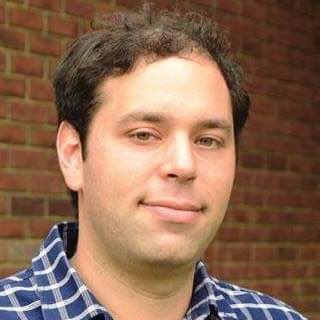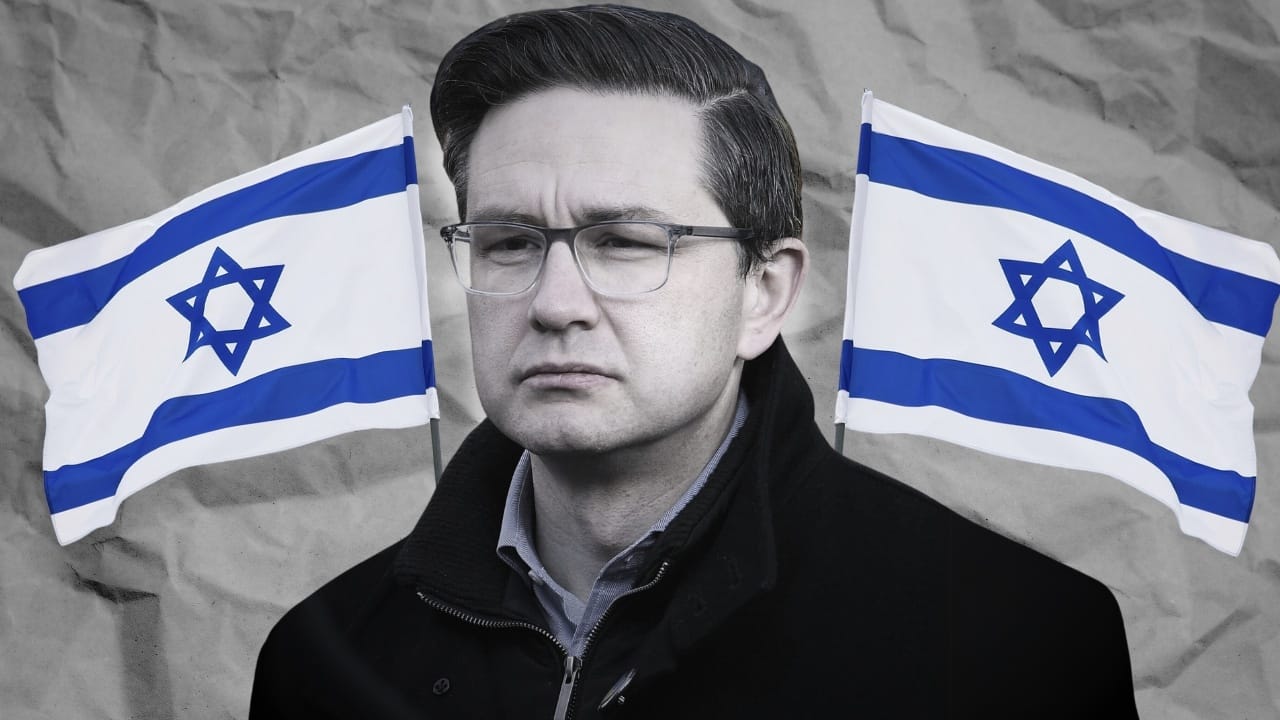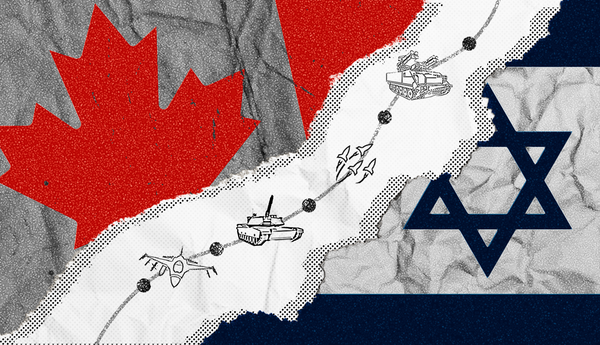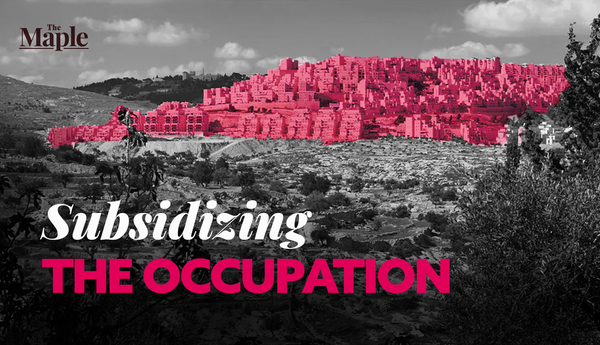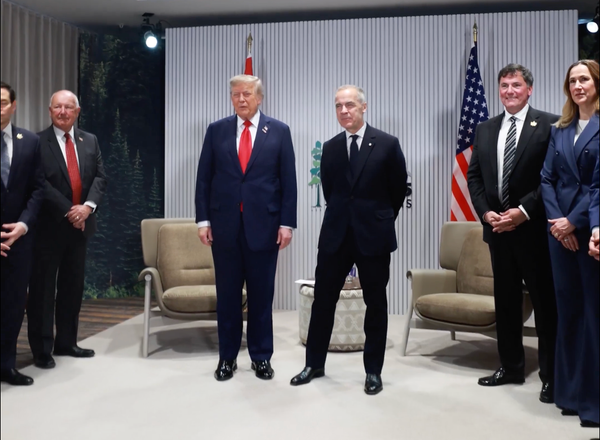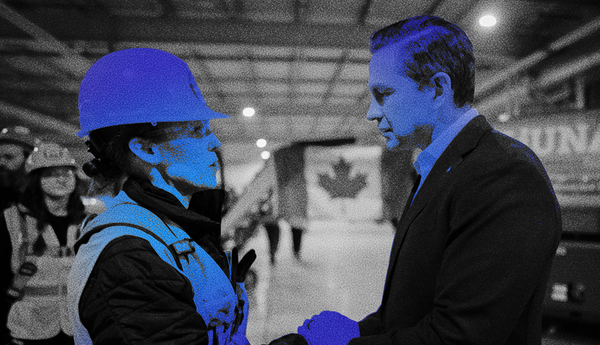Since Israel began its brutal attack on Gaza last October, public opinion in Canada has shifted toward sympathy for the Palestinians, with 50 per cent of Canadians believing Israel’s war has been too “heavy handed,” according to pollster Angus Reid.
At the same time, poll after poll points to Conservative Party leader Pierre Poilievre, a life-long supporter of Israel, winning the next federal election with a comfortable majority, thanks in large part to a range of domestic issues far removed from Israel’s war on Gaza.
Despite the shift in public opinion in regards to Israel’s conduct, Poilievre has shown little sympathy toward those who care about protecting Palestinians.
After Hamas led an attack on southern Israel on October 7, Poilievre joined a chorus of other political leaders in expressing unconditional support for Israel, declaring that “Israel has the right to defend itself against these attacks and respond against the attackers.” During a campaign stop in British Columbia, he laid the blame for the carnage that Israel had already inflicted on Gaza in the immediate aftermath solely at the feet of Hamas, which he called “a sadistic, genocidal, terrorist death cult [that] must be stopped.”
During a speech in Parliament on October 16, Poilievre acknowledged that “the suffering of the Palestinian people is a tragedy” and that “all of us must do everything in our power to preserve this precious life and minimize the suffering of innocent civilians.” But the Conservative leader avoided any call for Israel to exercise restraint, and again placed the blame for Palestinian suffering entirely on Hamas’ shoulders, insisting that the group “seeks the maximum suffering of Palestinians as well.”
The Conservative leader expressed support for a “two-state solution,” but said “stability and security for the Israeli people are necessary for that to happen,” with no reference to Palestinians deserving similar assurances as a precondition for any such negotiations.
Since October, Israel has killed at least 36,221 Palestinians, inflicted a humanitarian catastrophe and forcibly displaced at least 85 per cent of the population of Gaza. Israel is currently on trial for genocide at the International Court of Justice, which stated in January that the case against Israel is “plausible.”

This month, International Criminal Court Prosecutor Karim Khan announced he had applied for arrest warrants against Israeli Prime Minister Benjamin Netanyahu, Israeli Defence Minister Yoav Gallant and Hamas leaders. Khan said he had “reasonable grounds” to believe the Israeli officials bear “criminal responsibility” for “war crimes and crimes against humanity.”
During the seven months of Israel’s war on Gaza, the governing Liberal Party of Canada has shown signs of wanting to give the appearance of qualifying its support for Israel, with the Trudeau government voting in favour of a watered-down, non-binding motion that, among other things, called for an end to the “further authorization and transfer of arms exports to Israel.” In practice, the Trudeau government said it would only defer approvals of new permits for such exports.
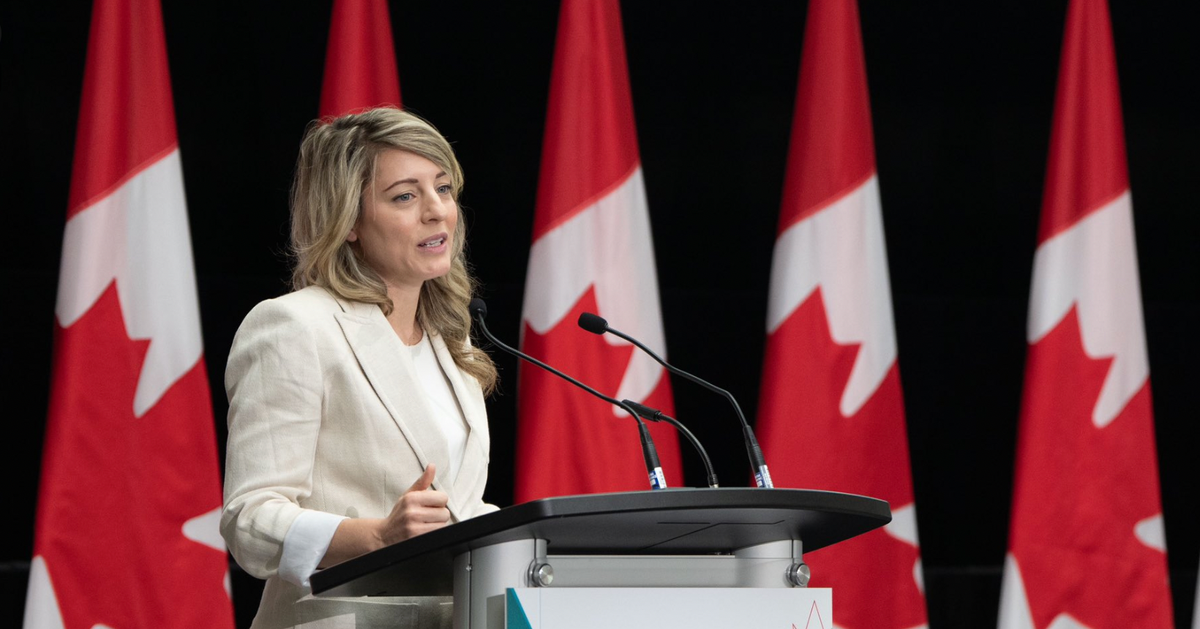
Poilievre, by contrast, has offered no hint of softening his hardline support for Israel and defence of its actions. In an October 24 speech in Parliament, the Conservative leader condemned Prime Minister Justin Trudeau for comments he made suggesting Israeli responsibility for an explosion outside Al-Ahli Hospital in Gaza. Since then, Poilievre has made no comment on Israel’s well-documented attacks on hospitals and other pieces of civilian infrastructure in Gaza.
In March, the Centre for Israel and Jewish Affairs (CIJA), Canada’s leading pro-Israel lobby group, gave thanks to Poilievre’s Conservatives and other MPs who voted against the motion that called for an end to military exports to Israel, and which also demanded the protection of Palestinian civilians.
‘You Have Friends In The Conservative Party’
Poilievre’s clearest and most unequivocal support for Israel since its attack on Gaza began came during a recent speech at a synagogue in Toronto, where he hit on key pro-Israel talking points, many of which have either been debunked or at least strongly disputed.
These include: that Gaza was not occupied by Israel before October 7, and that peace existed prior to that time (claims that are rejected by leading human rights groups); that it is Iran that ‘occupies’ Gaza, with Hamas acting as a puppet; that Israel should only be asked to end its attack when Hamas unconditionally releases the remaining Israeli hostages held by the group; praising the development of peace talks between Israel and the Saudi monarchy; accusing Iran, without evidence, of instigating pro-Palestinian protests in Canada, which he called “antisemitic uprisings” that “specifically target the Jewish people” (many of the protests are co-organized by Jewish activists); and repeating debunked claims that a Toronto pro-Palestine march in February targeted a Jewish hospital.
Poilievre furnished his talking points with personal anecdotes, including a story about a backpacking trip he said he once took to Israel. “I’ve been to many places that goys never go,” he said. Throughout the speech, the Conservative leader referred to all Jewish people and the State of Israel interchangeably, reflecting a view that is strongly refuted by Jewish anti-Zionists.
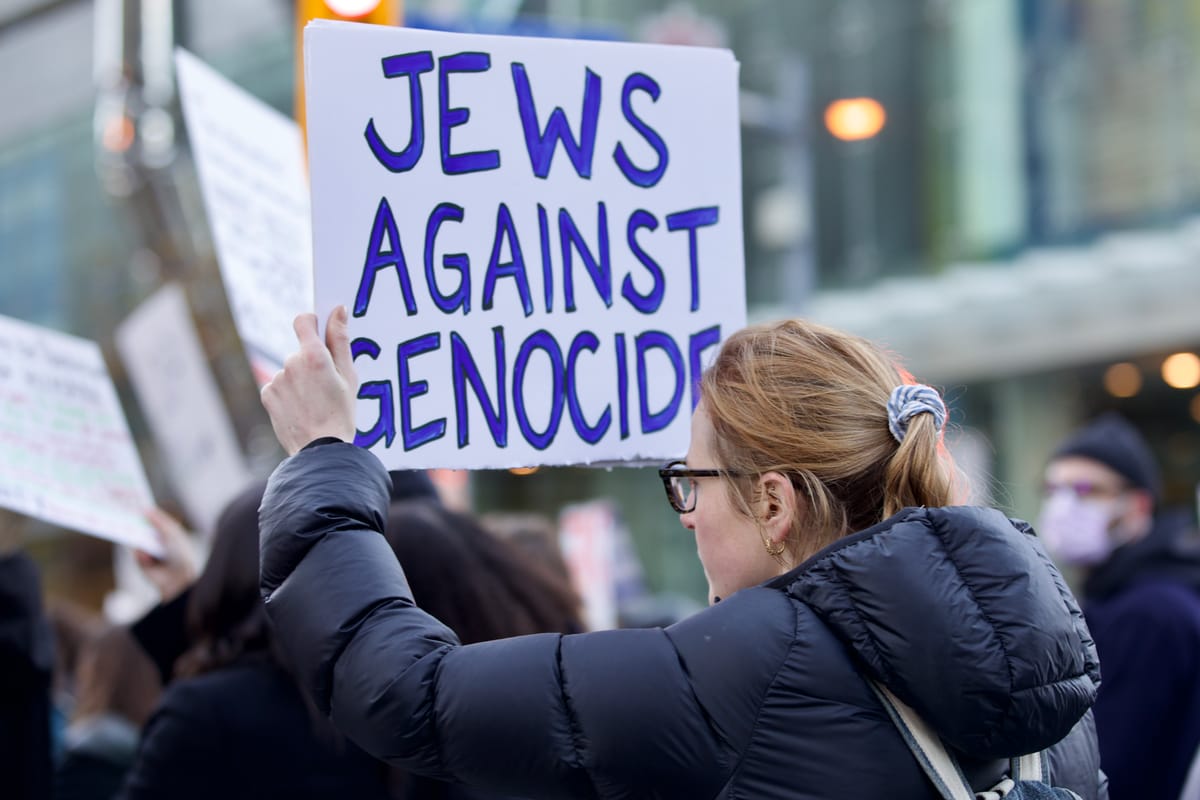
He concluded by declaring: “All of these thousands of years have gone by, and the Jewish people, the eternal Jewish people, continue to triumph. And they will triumph once more. You have friends in the Conservative Party.”
For Abigail Bakan, a Jewish political scientist at the University of Toronto, Poilievre’s speech was indicative of a hardline approach to supporting Israel.
“For him to be seizing the platform and to be carrying a narrative that is virtually indistinguishable from the politics of the state of Israel in Netanyahu’s articulation is really shocking,” Bakan told The Maple.
Equally noteworthy, Bakan said, was Poilievre’s omissions, particularly in regards to concerns about Palestinian rights. “There was zero sense of empathy or identification,” she said, adding that his speech amounted to a “civilizational discourse,” that implicitly pits “a Western enlightened civilization” against “Arabs and Muslims.”
“He’s trying to be a muscular Canadian nationalist in what he’s presenting,” Bakan explained. “He’s increasing a sentiment of extreme domestic repression.”
Yasmeen Abu-Laban, a Palestinian-Canadian political scientist at the University of Alberta who co-authored a book with Bakan in 2019, told The Maple that biblical references in Poilievre’s remarks reflect an interpretation of events influenced by Christian Zionism, a political ideology that seeks the consolidation of the state of Israel as a precursor to armageddon.
She also noted Poilievre’s painting of Canadian university campuses as supposed hotbeds of antisemitism.
“It does a disservice in so many ways to the role of our universities, in terms of education, in terms of putting forward the next generation of global leaders and in terms of the diversity of research that’s done,” Abu-Laban explained.
But more broadly, she said, Poilievre’s speech reflected a broader failure among the Canadian political class. “We’re lacking moral leadership right now on this issue. We have politicians that can’t seem to get out of the way that they’ve long talked about [these] things.”
Electoral Calculations
Poilievre’s unqualified support for Israel has prompted speculation that he could be at risk of losing some support in certain constituencies, especially among Arab and Muslim voters.
In March, Nawaz Tahir of the Hikma Public Affairs Council in London, Ont., told The Globe and Mail that it would be “much more difficult” for Poilievre to build ties with Canadian Muslims given his support for Israel’s war.
The Conservative Party has reportedly been seeking to win over socially conservative voters in certain sections of Muslim communities, in part by appealing to the issue of “parental rights,” a term widely regarded as a dog whistle for anti-LGBTQ politics.
However, a former director of multiculturalism policy for the federal government told the Globe that Poilievre turning away some Muslim voters because of his hardline support for Israel’s actions would be unlikely to stop him from winning the next election, based on current polling numbers.
By contrast, the issue of supporting Israel appears to be posing a much bigger challenge for the Liberals. In April, Fareed Khan, a human rights activist with Canadians United Against Hate, told CBC News: “I will never help another Liberal in this government.” Zionist groups, meanwhile, are not satisfied that the Trudeau government’s support for Israel’s brutal war has been strong enough.
Whereas Israel’s war is understood as presenting a significant problem for a Liberal government attempting — and, by most accounts, failing — to keep constituencies with diametrically opposed views on the issue under its tent, the Conservatives are seen as being happy to go all in with its support for Israel, regardless of any electoral trade offs that this might entail.
During his speech at the Toronto synagogue, Poilievre declared: “I’m a friend of Israel, and I say that in the mosque just as I say it in the synagogue.”
“That might not be necessarily the best way to win votes in certain audiences, but I think that people on all sides of this debate respect a leader who doesn’t speak out of both sides of his mouth,” he added.
Even before October 7, Poilievre had signalled his comfort with some of the most extreme, right-wing elements in Israel. In December 2022, Ricochet reported that the Conservative leader met with Chaim Silberstein, a far-right developer of property in occupied East Jerusalem who has argued that Israeli settlers should be permitted to “shoot to kill” rock-wielding Palestinians.
But the roots of Poilievre’s hardline support for Israel go back even further. To understand Poilievre’s position on Israel, academics interviewed by The Maple said one need only look to the premiership of Stephen Harper.
When asked what kind of Israel policy voters might expect under a Poilievre-led government, Michael Lynk, who served as the special rapporteur on the situation of human rights in the Palestinian Territories between 2016 and 2022, told The Maple: “It would be largely a reintroduction of the foreign policy of Stephen Harper.”
In 2015, Lynk wrote an article detailing Harper’s policy on Israel, which he argued “[u]ltimately embarrasses Canada while comforting a truculent government deeply at odds with international law and opinion.”
This was reflected in what Lynk described as the Harper government’s “belligerent tone” with respect to Israel.
The Harper Years
Harper was officially sworn in as Canada’s prime minister on Feb. 6, 2006, two weeks after Hamas won a legislative majority with 44.5 per cent of the popular vote, defeating the Fatah party in what remains the most recent Palestinian national election.
Setting the tone for how Harper would approach Israel and Palestine moving forward, in March 2006 Canada became the first government in the world after Israel to cut off aid to the Palestinian Authority (PA), the body established in 1994 to govern Palestinians in the Occupied Territories — a decision Poilievre would repeatedly boast of in the House of Commons.
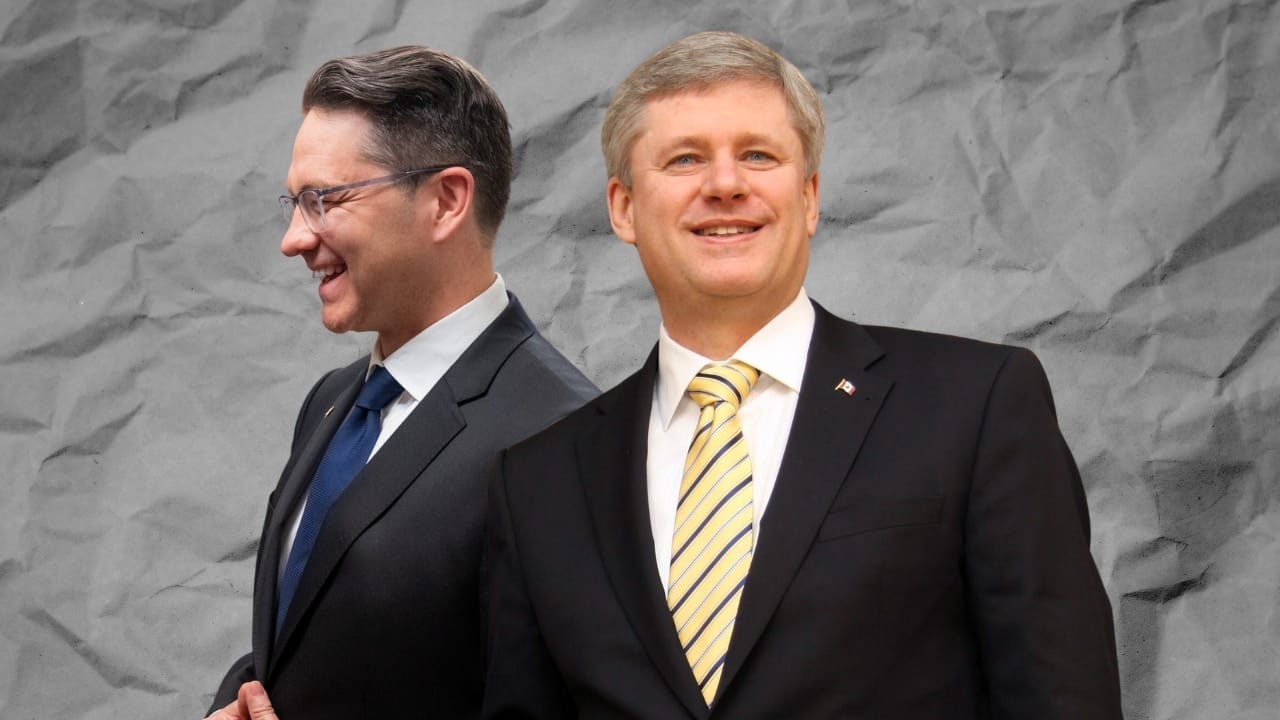
The Canadian government slashed $7.3 million in assistance, which included funds to rebuild homes destroyed by Israeli attacks, refurbish and manage an industrial park in Ramallah to address unemployment, and convene an international meeting of justice ministers.
The same day he dispatched foreign affairs minister Peter MacKay to announce the suspension of funding for Palestinian governance, Harper called Israeli prime minister Ehud Olmert to congratulate him for winning the Israeli election.
Funding to the PA was eventually restored, and increased to $8 million, in July 2007 after Hamas pre-empted a U.S.-backed Fatah coup in Gaza and the PA dissolved its unity government.
Harper had the opportunity to further burnish his pro-Israel credentials again in July 2006, when Lebanese Shia paramilitary organization and political party Hezbollah fired rockets into Israel, killed three Israeli soldiers and kidnapped two others in order to exchange them for Lebanese prisoners held in Israeli custody.
Israel responded by launching a full-blown 34-day war against Lebanon, killing around 1,200 Lebanese people, mostly civilians, while Hezbollah rocket fire killed 158 Israelis, mostly soldiers.
Harper fully endorsed Israel’s “right to defend itself,” placing “the onus to end this escalation […] on the other side.”
“Israel’s response under the circumstances has been measured,” he added.
Two days later, an Israeli airstrike killed seven members of the el-Akhras family from Montreal who had been visiting a village near the Israeli border. Four of the casualties were children — Saja, 8, Zeinab, 6, Ahmad, 4, and Salam, 1.
“We are not going to give in to the temptation of some to single out Israel, which was the victim of the initial attack,” Harper told reporters on July 17.
On July 25, Canadian Maj. Paeta Hess-von Kruedener of Kingston, Ont., was one of four international peacekeepers killed in an Israeli airstrike on a clearly marked UN post, despite the peacekeepers having called the Israelis 10 times within six hours pleading with them to halt the bombing.
Rather than condemn the killing of a Canadian soldier, Harper questioned what he was doing in southern Lebanon.
“We want to find out why this United Nations post was attacked and also why it remained manned during what is now, more or less, a war during obvious danger to these individuals,” he said the following day.
In April this year, Poilievre remained silent when Israel killed seven aid workers, including a Canadian citizen and army veteran, in Gaza.

The Harper government took the same ostentatiously pro-Israel approach it displayed with Lebanon in 2006 toward the Israeli invasion of Gaza in late December 2008 and January 2009, dubbed “Operation Cast Lead,” in which 1,417 Palestinians and 13 Israelis were killed.
Harper, however, kept a relatively low profile, dispatching his junior foreign affairs minister Peter Kent, who weeks before the war boasted that “we never criticize Israel publicly” on the issue of Israeli settlements in the occupied West Bank, despite conceding that the government described such settlements as “unhelpful” for peace talks.
On Jan. 6, 2009, when Israeli mortar shells killed 43 civilians sheltering at the Ibn Rushd Preparatory School for Boys in the Jabalia refugee camp, Kent immediately leapt to Israel’s defence.
“We really don’t have complete details yet, other than the fact that we know that Hamas has made a habit of using civilians and civilian infrastructure as shields for their terrorist activities, and that would seem to be the case again today,” Kent told The Globe and Mail, accusing Hamas of “trying to have more of their people killed to make a terrible terrorist point.”
Changing UN Voting Pattern
A week after the attack on the Ibn Rushd school, Canada cast the sole vote at the United Nations Human Rights Council against a resolution calling for an international investigation into “grave” human rights violations by Israel, foreshadowing its vehemently pro-Israel voting record at the United Nations General Assembly (UNGA) once Harper achieved a majority government in 2011.
Throughout his tenure in power, Harper’s position on Israel became increasingly “not only opposed to any kind of accountability process, but bombastically so,” Mark Kersten, an expert in international law at the University of the Fraser Valley, told The Maple.
He attributed Harper “staking out this ground” largely to domestic political considerations. Kersten noted this was likely driven in part by pro-Israel groups that saw in Harper something of a “grandfather” of a right-wing coalition uniting Evangelical Christians and Israel advocates together in common cause.
The Conservative prime minister’s public displays of affection for Israel included serenading Netanyahu in 2014 with a personalized rendition of The Beatles’ “Hey Jude.” Harper has maintained his staunch support for Israel since leaving office, and is a leading partner at a venture capital firm, AWZ Ventures, that has poured at least $350 million into tech companies that support Israel’s security industry.
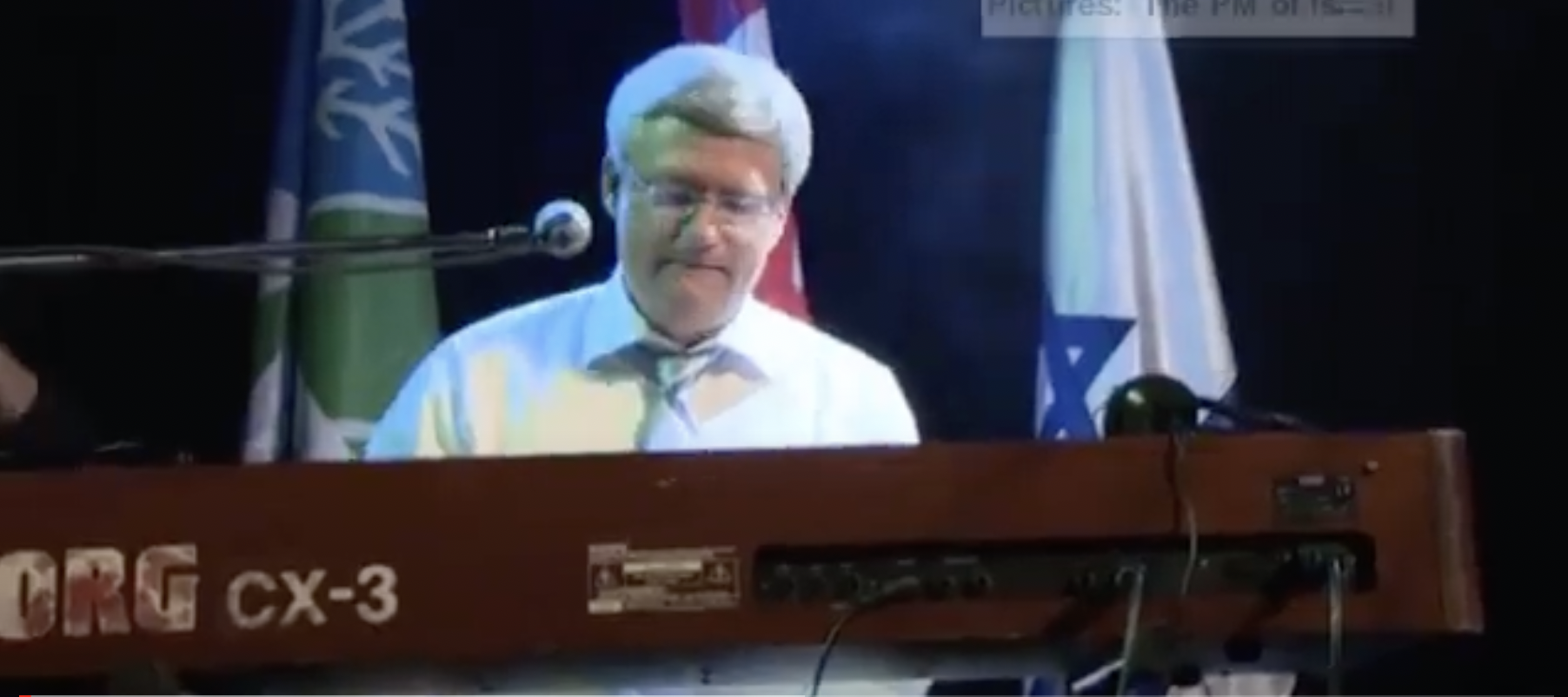
“I think there is a constituency for that [pro-Israel] position in Canada and if you have those views, the only place on the political spectrum really is the Conservative Party,” said Kersten, who described Harper’s approach as being “vehemently opposed to Palestinian statehood, and opposed to Palestinian access to international institutions, like the International Criminal Court.”
There are 16 standing UNGA resolutions on the question of Israel and Palestine, such as affirming the Palestinian right to self-determination, denouncing Israeli practices in the Occupied Territories which impact Palestinian human rights, and calling for a peaceful settlement to the conflict, which pass each year with large majorities.
When Harper first came to power, his government generally supported his Liberal predecessor Paul Martin’s voting record, with the exception of voting against, rather than abstaining from, a resolution condemning Israeli practices in the Occupied Territories in 2006.
That year, Canada also began abstaining from, rather than voting in favour of, the right to Palestinian self-determination, as well as resolutions affirming Palestinian control over their natural resources and extending the mandate of the UN’s special information program on the question of Palestine.
In 2007, Canada began voting against Palestinian control over their natural resources and the special information programme, and for the first time abstained from a resolution affirming the right of return for Palestinian refugees displaced in the 1967 Arab-Israeli War.
With a secure majority, the Harper government began voting against almost every UNGA Israel and Palestine resolution in 2011. One exception was abstaining from a vote for a resolution supporting the mandate of the United Nations Relief and Works Agency (UNRWA), which provides public services and aid to Palestinians in refugee camps in the Occupied Territories, Jordan, Syria, and Lebanon.
That trend has largely continued under Trudeau, with two notable exceptions. In 2019, the Liberals began voting in favour of Palestinian self-determination for the first time since 2005, and in 2023 voted in support of UNRWA’s mandate for the first time since 2010.
In 2020, Poilievre went on the attack against the Trudeau government, which he claimed had “abandoned Israel” by changing Canada’s voting record at the UN. “It gave up all of this moral authority in exchange for absolutely nothing,” he said of the Trudeau government.
Conservative Treasury Board president Vic Toews in January 2010 announced Canada had cut funding for UNRWA, redirecting it toward, among other specific projects, PA law enforcement, “in accordance with Canadian values.”
The Liberals restored $25 million in UNRWA funding in November 2016. In January 2024, after the Israeli government made unsubstantiated claims that a dozen UNRWA staff actively partook in Hamas’ October 7 attack on southern Israel, International Development Minister Ahmed Hussen announced a temporary pause in funding to UNRWA, alongside other Israeli allies, including the U.S. and Germany.
By March, funding was restored and no annual payment was missed, which Hussen said was a result of behind-the-scenes pressure from U.S. envoy to the UN Linda Thomas-Greenfield, whose own government has yet to resume funding for UNRWA.
Poilievre has promised to again cut funding for UNRWA if he becomes prime minister, calling it a “terrorist” organization.
Civil Society Crackdown
Even before the Harper government cut UNRWA’s funding, it cut funding for domestic civil society organizations that fell afoul of the government’s militant pro-Israel messaging, with then-citizenship and immigration minister Jason Kenney loudly accusing such groups of antisemitism.
In March 2009, Kenney announced he was considering cutting a grant for the Canadian Arab Federation’s (CAF) language instruction program for newcomers after its president, Khaled Mouammar, called Kenney a “professional whore who supports war” for supporting Israel in Lebanon and Gaza.
Kenney boasted to an audience at the University of Toronto that he had followed through with cutting $2 million in funding for the CAF.
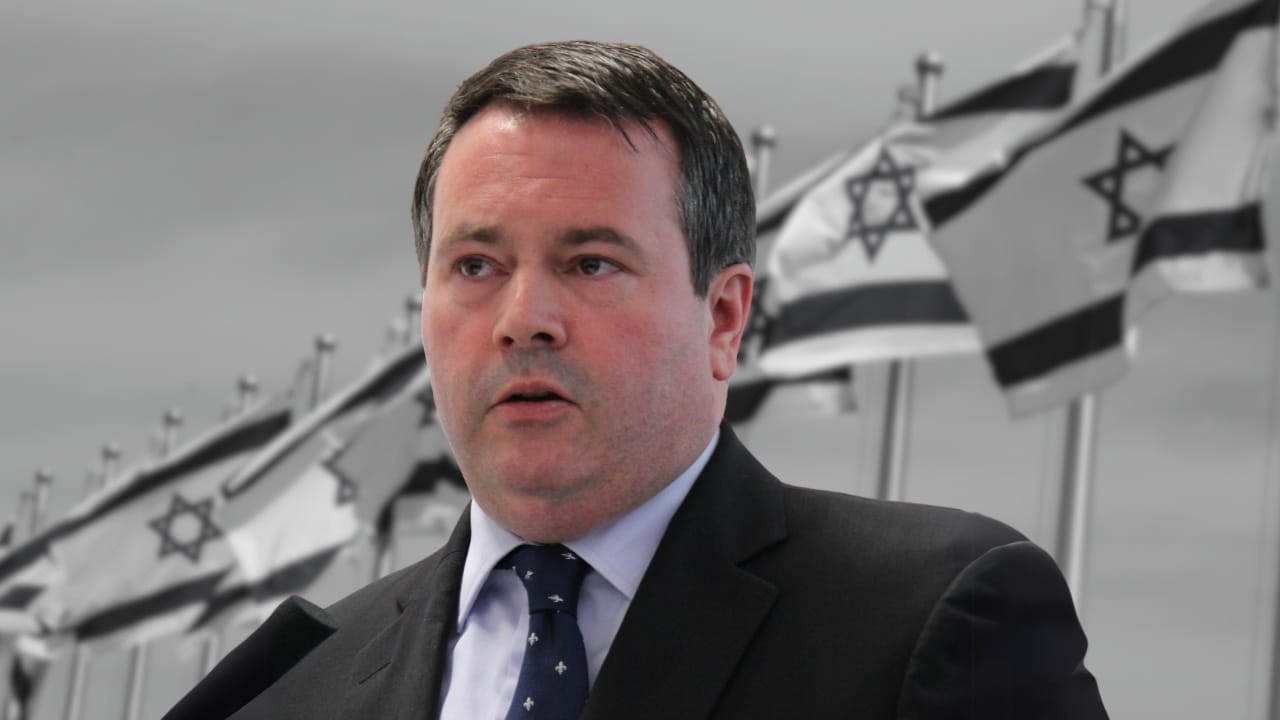
Claiming the cut had nothing to do with Mouammar’s remark about him, Kenney accused the federation of supporting Hamas and Hezbollah, because it advocated for both groups’ removal from Canada’s terrorism watch list.
He promised there was more to come, declaring the government was launching a review of all its public service grants as part of a broader “zero-tolerance approach to expressions of antisemitism in the public sphere.”
“We’re so self-congratulatory about the success of our model of pluralism and diversity that surely no one could really mean ill in Canada,” he said. “We don’t necessarily all subscribe to Canadian values, and we should be willing to recognize those that don’t.”
When international co-operation minister Bev Oda rejected a $7.1-million grant for the international Christian aid organization Kairos in November 2009, adding “not” to a Canadian International Development Agency (CIDA) document she had signed approving its request, there was speculation that the rejection was retaliatory for Kairos’s vocal criticism of Alberta’s tar sands.
A couple of weeks later, Kenney revealed the true political motive to an audience at a conference on antisemitism in Jerusalem. The government cut funding for Kairos, with which it had partnered on international aid projects for 35 years, Kenney said, because the organization took a “leadership role” in the boycott, divestment and sanctions (BDS) movement against Israel, touting the cut as an example of the Harper government’s “zero-tolerance approach” in action.
But Kairos didn’t support BDS. Its board voted against boycotting Israel and advocating sanctions, then-executive director Mary Corkery told the Canadian Jewish News. “The only part that we have accepted as a possibility is divestment,” she said.
In an interview with the Toronto Star, Corkery said her organization was targeted by Kenney for merely taking “positions that critique actions of the Israeli government.”
“If any group that criticizes an action by the government of Israel is called anti-Semitic by the government of Canada, that’s very serious,” she said.
In a December 2009 statement, the organization said Kenney’s remarks called into question the integrity of the CIDA decision-making process.
“If aid decisions are based on political rumour rather than on due diligence, development criteria and CIDA’s own evaluation process then this is a matter of grave concern for the entire international development sector — and for the Canadian people who pay for this aid,” it said.
A Loyal Foot Soldier In Parliament
During the Harper years, Poilievre gave several speeches in Parliament that pushed the government’s pro-Israel line and hit on some of his own core ideological concerns.
In particular, Poilievre’s expressions of support for Israel sometimes doubled as attacks on Canadian labour unions and left-wing advocacy groups. In June 2006, he presented a petition condemning the Canadian Union of Public Employees’ (CUPE) decision to boycott products from Israel, which he referred to as “that leading democracy.”
In May 2008, Poilievre hailed the 60th anniversary of the foundation of the state of Israel, again claiming it is “one of the world’s most advanced democracies,” before turning his attention to “radical left-wing groups [that] are targeting the Jewish state.”
Specifically, he condemned the Canadian Union of Postal Workers (CUPW) for passing a resolution in support of BDS, as well as “radical left-wing groups on campuses” that organized events raising awareness about Israeli apartheid.
Nearly a year later, Poilievre again rose in the House of Commons to declare that Israel “has no better friend than our Conservative Prime Minister, who has reversed the policy of his predecessors.” He then repeated a common colonial myth about Israel cultivating a society in an uninhabited desert: “Where once was barren sand. Now there are trees.”
He echoed similar praise again in 2012, calling Israel the “aboriginal homeland” of Jewish people and celebrating it as “one of the most technologically, democratically, culturally and educationally advanced nations on earth.”
In May 2010, Poilievre again targeted CUPW, this time for opposing a joint postage stamp initiative between Canada and Israel based on concerns about Israel’s occupation of Palestine and human rights violations, and yet again in November 2012 when CUPW planned to send delegates to the World Social Forum’s “Free Palestine” conference, which Poilievre slammed as “an extreme anti-Israel” gathering.
In 2009, Poilievre was at the centre of a small controversy when his party distributed flyers in several electoral ridings — including the one represented by Liberal MP Irwin Cotler, who last year received a lifetime achievement award from CIJA — that accused the Liberals of being weak in their support for Israel and opposition to antisemitism. The matter descended into a war of words between the two parties who each sought to portray themselves as being more loyal to Israel.
After Trudeau’s Liberals swept to power in the 2015 election, Poilievre’s interventions in the House of Commons on behalf of Israel became less frequent. In 2016, he rose to pay tribute to deceased former Israeli prime minister Shimon Peres, lauded by Western politicians as a statesman and peacemaker but decried by critics as a war criminal.
A Hardline Future
Given Poilievre’s personal record and that of the Harper government, experts told The Maple that hardline support for Israel and disregard for Palestinian rights should be expected from the next Conservative premiership.
In some regards, said Kersten, Poilievre and his team, including vocally pro-Israel MPs like Michael Chong and Melissa Lantsman, “are actually more pro-Israeli government than Israelis are,” referring to protests that have taken place in Israel calling on the government to strike an immediate hostage deal with Hamas.
Asked if he thought Canada may play a meaningful role in helping Palestinians pursue justice when Israel ends its attack on Gaza, Kersten said “there’s no chance.”
Lynk said Poilievre would very likely follow through on his threat to cut funding to UNRWA, and revert Canada back to abstaining or opposing motions in support of Palestine at the UN. Canada may also cut funding for international courts if they continue their moves to put Israel in the docket.
Lynk also noted that Canada is currently looking to gain a seat at the UN Human Rights Council in 2028, a campaign which he suspects Poilievre would withdraw from or lose, given Canada’s failure to win a seat on the UN Security Council in 2020 due to its support for Israel.
Poilievre’s support for Israel would also likely be accompanied by little, if any, criticism of Saudi Arabia, given the authoritarian monarchy’s continued holding out of the prospect of normalizing ties with Israel. That prospect is itself likely a strategy on the Saudis’ part to try to dispel its pariah status in Western public opinion, Lynk said.
“It certainly would be the accumulation of Israeli and American foreign policy to be able to get this triangular relationship between the U.S., Israel, and Saudi Arabia in there,” he explained.
Such support on Poilievre’s part may also include continued lip service toward supporting a Palestinian state, but this would be unlikely to make any real progress. “We must understand that there’s no commitment from any Zionist party in Israel today for a genuine Palestinian state,” said Lynk.
Another variable factor is the outcome of the next U.S. presidential election. However, given U.S. President Joe Biden’s avowed support for Israel during its war on Gaza, Lynk said the only thing likely to change under a second Donald Trump presidency could be Trump’s opening the door to Israel’s formal annexation of Palestinian territory, a crime under international law.
“If Donald Trump became president again and then Poilievre became Canadian prime minister, I would suspect you would see very little daylight in their positions with respect to Israel and Palestine,” said Lynk. Poilievre’s full-throated support for Israel would also likely be matched by unremitting hostility toward anything remotely influenced by Iran, he added.
Broadly speaking, a Poilievre premiership would entail Canada taking an even more belligerent and hawkish position in the Middle East.
“If he’s given more power, it will be a very dangerous situation on a global scale,” said Bakan. “That also depends on what happens in the American elections and various European elections.”
Bakan also took issue with Poilievre’s claimed affinity with Jewish culture and opposition to antisemitism, given his associations with far-right groups that are accused of engaging in antisemitic dog whistling. In fact, Poilievre “represents the opposite” of the Jewish traditions of social justice and solidarity, she said.
“There’s a bizarre coalescing of extreme antisemitism and Zionism that’s taking place,” Bakan explained. “There’s nothing about Poilievre’s conception of foreign policy that would be protective of Jewish identity.”
While Poilievre’s unquestioning support for Israel certainly sits on the extreme end of Canada’s foreign policy spectrum, Kersten noted, it nonetheless emerges from a much broader consensus regarding support for Israel among Canada’s political class.
“There is a very large section of the ‘Western foreign policy establishment’ that for decades has just been unquestioning about its support of the Israeli government, and in doing so has willfully, at times, downgraded the relevance not only of Palestinian statehood […] but of the fact that there’s a basic human right to self-determination that applies to individual lives,” he said.
“Whether it’s in Canada or the United States, or the United Kingdom, I think there’s a well established differential in the way that lives are viewed through this foreign policy establishment,” he continued.
“There’s something embedded in Canadian foreign policy circles that is unwilling to give as much care to Palestinians and Arabs more generally than they are to Israelis.”
Jeremy Appel is an independent Edmonton-based journalist and the author of Kenneyism: Jason Kenney’s Pursuit of Power.
Alex Cosh is the news editor of The Maple.


